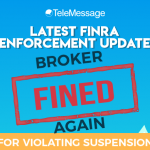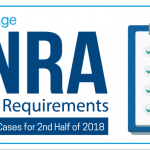Archiving mobile messages, if done without the right technology, requires a tremendous amount of organizational time and resources. While archiving mobile messages can be time-consuming, it is absolutely necessary as a result of various industry and government archiving laws.
We offer the following comparison of selected financial and government regulations regarding the retention of mobile messages.
1. FINRA
The Financial Industry Regulatory Authority sets various requirements on the capture, monitoring, and archival of broker communications, and supervisory review process demands.
Who Must Comply with These Regulations?
Every member of a national securities exchange who transacts a business in securities directly with non-members of a national securities exchange, and every broker or dealer who transacts a business in securities through the medium of any such member, and every broker or dealer registered pursuant to section 15 of the Securities Exchange Act of 1934.
What are the Requirements of this Regulation?
To comply with the regulations, financial institutions and securities dealers must:
- Retain electronic correspondence with customers and other relevant communications for at least 3 years on non-rewriteable and non-erasable storage, AKA Write Once, Read Many (WORM)
- Store files on a system that prohibits alterations, erasure or loss of files
- Index communications for ease of access
- Keep a duplicate copy of each record stored in a separate location
2. Gramm-Leach Bliley Act
The Gramm-Leach Bliley Act imposes rules on privacy of financial information about customers and sets standards on how to protect this information.
Who Must Comply with These Regulations?
The GLBA affects the financial services industry, which includes banking, insurance, and investment institutions.
What are the Requirements of this Regulation?
In terms of compliance, GLBA created two key regulations, the Financial Privacy Rule, and the Safeguards Rule, that govern the collection, storage, protection, and disclosure of customers’ financial information.
Under the Financial Privacy Rule, a company must provide its customers a privacy notice that includes the following:
- Information about the non-public personal customer information a company collects.
- How and with whom the company shares that information.
- How the company protects that information.
3. Dodd-Frank Act
The Dodd-Frank Wall Street Reform and Consumer Protection Act is financial reform legislation which made changes in the American financial regulatory environment that affected all federal financial regulatory agencies and almost every part of the nation’s financial services industry.
Who Must Comply with These Regulations?
These rules are mandatory for Swap Dealers (SD) and Major Swap Participants (MSP).
What are the Requirements of this Regulation?
The recordkeeping requirements of Dodd-Frank Act stipulates several separate rules, all of them are inter-related. The key highlights of the requirement are as follows:
- Swap dealers and major swap participants must now retain transactional data related to trades. This data includes the information created before, during and after a trade
- Transactional records include all oral (phone, voice mail) and written (email, chat, SMS, fax) communication that led to trade execution.
- Retention varies depending on record types. Since transactional records provide trade-related information, retention requirement is set to a life of a swap, plus five years. The exception to this is oral communication, where retention is one yea For non-transactional records, retention is set to five years from the moment record was created.
4. Federal Acquisitions Regulations
Federal Acquisition Regulation (FAR) is the body of laws that govern the U.S. Federal Government’s procurement process.
Who Must Comply wit h These Regulations?
Federal government agencies—as well as government contractors that win a contract—are regulated by the FAR and must follow the procurement rules and policies set forth in the FAR.
What are the Requirements of this Regulation?
The Subpart 4.7 of FAR provides policies and procedures for retention of records by contractors to meet the records review requirements of the Government. Overall, FAR require that contractors to the US federal government preserve all records, both hard copy and electronic, for between two and four years. This covers organizations that provide both physical products and services.
5. Sarbanes-Oxley
Enacted in 2002, the Sarbanes-Oxley Act (SOX) seeks to improve the reliability of financial reporting by public companies and their accounting firms. Although private companies are not subject to the regulations, SOX has raised the bar for financial reporting in general.
Who Must Comply with This Financial Regulation Text Message Archiving Requirement?
The Sarbanes-Oxley Act prohibits any kind of document destruction after the government makes an inquiry related to a criminal offense; and this includes publicly traded businesses, public organizations, nonprofits, and individuals.
What are the Requirements of this Regulation?
In general, publicly traded companies should maintain a complete and accurate business record for internal use and external reporting for up to seven years – as indicated in Section 302, 401, and 404. This includes archived copies of electronic documents and communications such as text messages.
If you don’t have the right mobile message archiving platform in place to do advanced archiving, and the ability to quickly search electronic communications, this inability could lead to legal complications or, at the least, a tremendous amount of employee hours and resources wasted on complying with court orders.
TeleMessage’s Mobile Archiver can handle the most advanced financial regulation text message archiving requirements and searching challenges with ease. Contact us for helpful information about mobile messages retention laws and to learn more about our robust archiving technology.
TeleMessage Mobile Archiving Solution Set:
Enterprise Number Archiver
Messages sent & received via a virtual number assigned to App users are archived. Read more
Android Archiver
The TeleMessage Android App runs in the background of your device and copies all messages and sends it to the TeleMessage server to be archived. Read more

Network Archiver
We’ve partnered with the leading mobile carriers to copy messages directly from the network side. Read more






